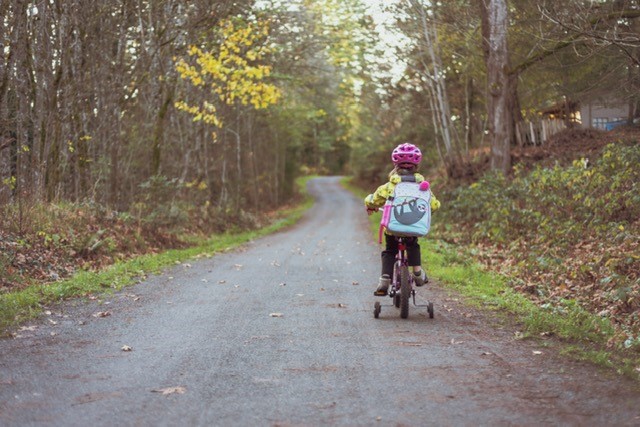How did you learn to ride a bicycle?
I remember vividly the Christmas our parents bought my younger sister and me our first bicycles. We were thrilled. Early on Christmas morning, they took us out into a quiet street and held the back of the seats while we wobbled along until, finally, we took off. Soon we were riding everywhere, with increasing skill and daring and, of course, a few tumbles along the way.
Later, when my youngest sister got her first bicycle, it had training wheels so, after tentatively pedalling along with Mum or Dad or a big sister holding the seat for a short time, she was whizzing along. When it came time to remove the training wheels, she could already balance and didn’t miss them at all.

The other day, I saw a small child on a little bicycle with no pedals, pushing himself along with his feet.
I’ve been thinking about this recently because I read a commentary criticising ‘scaffolded pedagogy’ as meaningless jargon. This criticism caused me to revisit some work I had done on this a while ago.
All these stories about learning to ride bicycles are examples of ‘scaffolded pedagogy’: scaffolded pedagogy simply means supporting someone to learn how to do something new until they can do it for themselves. It’s what parents and teachers do every day. I think grandparents, big sisters, other family members and friends can be included here too.
The person who conceived of this idea was a psychologist called Lev Vygotsky (1896–1934). Vygotsky’s ideas did not reach the West until the 1960s, largely because of the Cold War. You can read about his theory of social development here [https://www.simplypsychology.org/vygotsky.html].
“…Vygotsky felt social learning precedes development.” One implication is that other people have an essential role to play in helping you learn new tasks.
Vygotsky called these helpers More Knowledgeable Others. More Knowledgeable Others are people who have “a better understanding or a higher ability level than the learner, with respect to a particular task, process, or concept…normally thought of as being a teacher, coach, or older adult.” Vygotsky emphasised the importance of cooperative or collaborative dialogue.
And it’s not just humans. We see in nature countless examples of parents teaching their offspring the skills they need to survive: what and how to hunt for food, predators to avoid and even, in the case of the Australian butcherbird, giving singing lessons to younger birds.
Equally important is Vygotsky’s idea of the Zone of Proximal Development (ZPD), “the distance between a student’s ability to perform a task under adult guidance and/or with peer collaboration and the student’s ability” to undertake a task independently. Vygotsky believed that the Zone of Proximal Development is where learning happens.
Not only is our ZPD unique to us, but it’s also different for different tasks. When you learn something new, you have different knowledge and skills to call on. That’s one reason why each of us learns differently and in different ways. It’s also why individualised learning is so much more successful than a one-size-fits-all approach.
From Vygotsky’s work came a new idea, educational scaffolding, also known as scaffolded pedagogy: “a teaching method that enables a student to solve a problem, carry out a task, or achieve a goal through a gradual shedding of outside assistance.” [http://www.opencolleges.edu.au/informed/teacher-resources/scaffolding-in-education-a-definitive-guide/]
Generally, people begin learning something new with little knowledge and few skills. A More Knowledgeable Other ‘scaffolds’ or supports their learning and, as their knowledge and skills develop, the learner’s ability to undertake the new task increases. As the learner completes tasks with increasing success and decreasing support, the scaffold is gradually withdrawn. Finally, the student is able to complete the task successfully without support.
Another example is learning to drive. A learner driver must be accompanied at all times by a competent, licensed driver. This More Knowledgeable Other starts them off in back streets and empty parking lots, until they can – at the very least – steer and brake. Later, the learner drives on busier streets, then motorways and in peak hour. Once the learner passes the driving test, they are permitted to drive alone. However, their licence is provisional and has specific restrictions. A driver must hold a provisional licence until sufficient time has passed without serious driver errors, when they are permitted to hold a full licence.
One other aspect that arises from the criticism of scaffolded pedagogy mentioned at the beginning of this article. Some people find the theories and technical language of education confronting and so they can be dismissive of them, no matter how useful the ideas behind them are. It’s important to recognise that every profession has technical learning and technical language. The key is for teachers and other educators to be willing and able to explain these concepts clearly.
Vygotsky’s ideas were conceived in the context of child development but I believe they apply to adults too. How much support you need and how quickly you learn depends on the resources you are able to bring to your learning. If you can already speak six languages, chances are a seventh won’t be too much of a struggle. But if you are learning to ride a bicycle, you will probably need someone holding on to the back of the seat as you wobble off down the street for the very first time.


